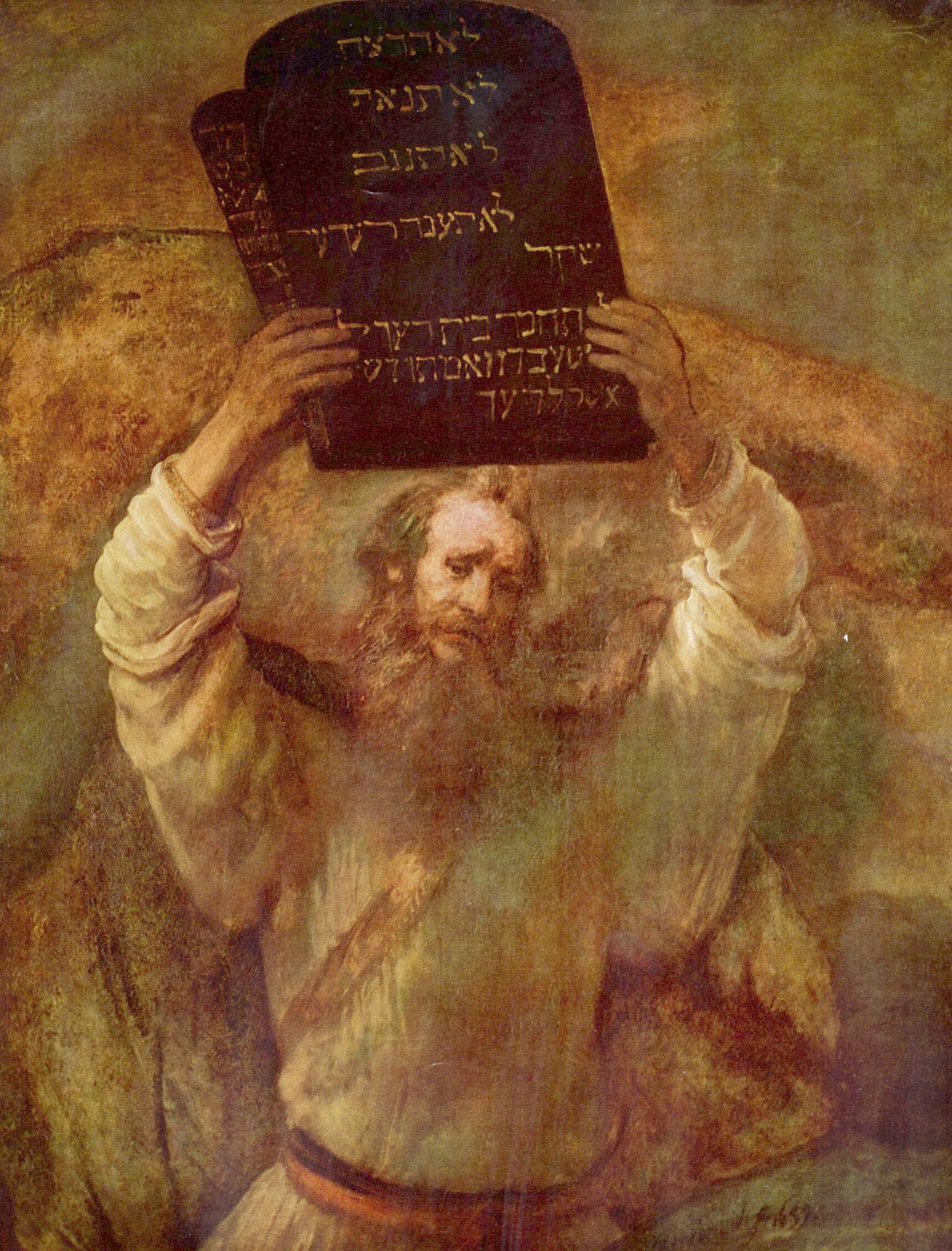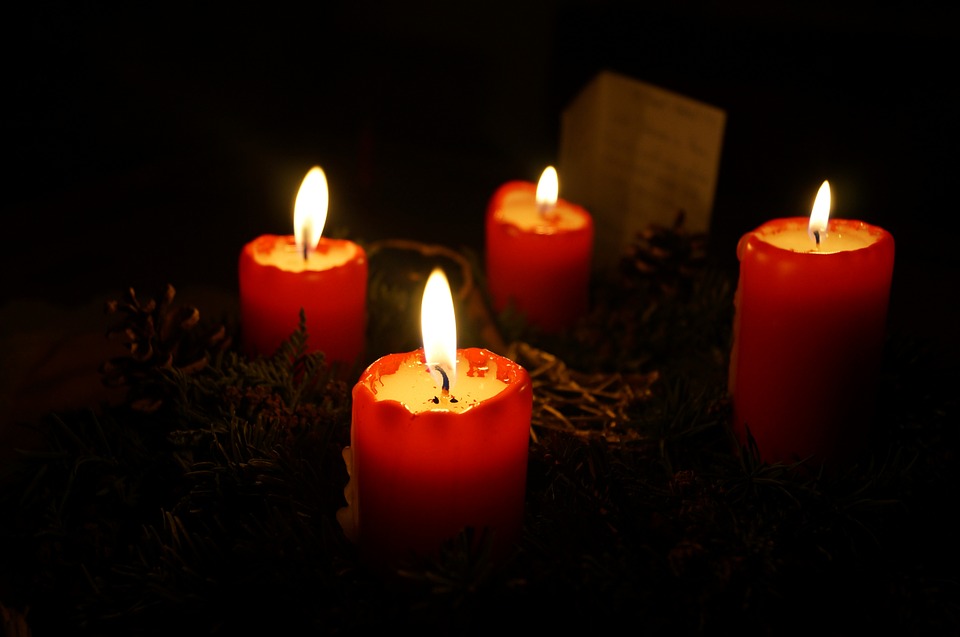The Goats, with Christmas, Passed

The Old Law has passed away. Since Christ’s presence is so near, now is the time of grace. Now is the time to do God’s will.
“By this ‘will,’ we have been consecrated
through the offering of the body of Jesus Christ once for all.”
Jesus was present to all three people in the Gospel: He was present to Elizabeth as the object of all her impossible hopes and the consolation for all she suffered. He was present within Mary, as the center of her contemplation and all the events of her life. He was present to John the Baptist as the reason for his existence and the goal of his vocation. Elizabeth shows us how Jesus is present in our past, Mary shows us his presence in the present, and John shows us his presence in the future.
A common, unspoken assumption among many Christians striving for holiness is that Jesus is waiting to be fully present to us until we have become some idealized version of ourselves. He is up ahead, it seems, waiting for us to be holier, more virtuous, purer, more organized, less fickle in our commitments, and less chaotic in our daily life. This idea is not only a lie, but a heresy. It’s pelagian, or at least semi-pelagian.
“You, Bethlehem-Ephrathah
too small to be among the clans of Judah,
from you shall come forth for me
one who is to be ruler in Israel”
It is good to admit our weakness, our littleness, and our insignificance in comparison with God’s holiness. This is what Mary did when she called herself the “lowly servant” of the Lord, and when John the Baptist admitted that he was unfit to untie Jesus’ sandals. This kind of humble awareness is childlike and realistic. The Imitation of Christ tells us, “Do not think that you have made any progress unless you feel that you are the lowest of all men.”

It is good, too, to realize the specific weaknesses resulting from our particular temperament, personality, and past experiences. This makes us more dependent on God’s grace and better prepared for the times when it will be difficult to do his will. We can realistically look ahead to the challenges of each day – the people, places, circumstances, and emotions that we will confront – and we can ask for specific grace to say “yes” in those moments. There is a difference, however, between realism and pessimism.
Pessimism, or discouragement at our weakness and littleness can’t be an option in the spiritual life. This discouragement is accompanied by a lack of peace, and it is always a sign of pride. It is a sure indication that our eyes are fixed narcissistically on our broken humanity instead of on Christ’s redeeming presence. Whether the source of our agitation is in the past, the present, or the future, it doesn’t matter. Wherever the problem is, Jesus is there too. He is in the past with his mercy. He is in the future, bringing the Father’s providential plans to fulfillment. And he is in the present, providing us with grace.
Therefore, the proper attitude at all times is humility, peace of heart, and confidence. This attitude frees us to do God’s will in the here and now, no matter what the obstacles or temptations. This will is unveiled to us by God’s moral law, by providence, by the duties of our present state in life, by superiors or spiritual directors, and by interior movements of the Spirit. No matter what the source of his will, we are capable of fulfilling it if, like Mary, we immerse our will in God’s grace.
In the Old Law (or Testament), sacrifices of rams, bulls, goats, and other animals were offered up as a way of doing God’s will. This was a provisional covenant, added on to the Ten Commandments which were God’s will preserved in stone. They were added after the Israelites worshiped the golden calf at the foot of Mt. Sinai when God was forming his covenant with them through Moses. It was a sort of penance which counteracted their fallen tendency to worship creatures instead of the creator.

But the bodies of rams, bulls, and goats could never fully take the place of God’s will. Instead, the Word of God would incarnate himself not in stone or in an animal, but in a human body. And he would not just take on the shell of a body, but assume a human soul with its intellect and will. This will would be perfectly subject to the divine will, as we see most clearly in the Garden of Gethsemane when Jesus falls prostrate and prays, “My Father, if it is possible, let this cup pass from me; yet, not as I will, but as you will.”
In the person of Jesus Christ, a human will is perfectly immersed in God’s original intention for humanity. The provisional, which served its purpose for a time, passes away, and the eternal will of God becomes present in time and space: “First he says, ‘Sacrifices and offerings,holocausts and sin offerings, you neither desired nor delighted in.’ These are offered according to the law. Then he says, ‘Behold, I come to do your will.’ He takes away the first to establish the second.”
Any obedience to God’s will on our part is only possible in and through Christ’s obedient self-offering. Even Mary’s Immaculate Conception was achieved by prevenient grace merited by Christ’s passion and death on the cross. From the very beginning of her existence, Mary was the perfect response to the Son of God’s self-offering. She continually cooperated and participated in God’s grace. She was, therefore, “full of grace,” and immersed in it. She was present, in each moment, to the grace that God made available to her. Whether it was confusing (at the annunciation and the finding in the temple), joyful (at the visitation and the resurrection), difficult (at the wedding feast at Cana), or seemingly impossible (at the cross), she was able to say “yes” with her whole being because she was wholly dependent on God’s grace.

Mary and Elizabeth are both able to carry out God’s will because they are attentive to the present moment. Unlike those who are constantly seeking signs, both of these women have a quiet, attentive, “interiority” about them. When the presence of God is near, they respond immediately without waiting for a sign. John the Baptist also takes on this characteristic, beginning with the moment he leaps in his mother’s womb, and continuing through his vocation to be the bridegroom’s friend, who introduces Jesus to humanity. We see this attentive interiority in God’s saints, too. Pope St. John Paul II, for instance, could “sense” the presence of the Blessed Sacrament when he walked past a chapel, even if there was no physical indication that the Eucharist was there.
So, rather than spending our time analyzing, worrying, or continually looking for signs, we should occupy ourselves with the will of God that is in front of us, and say “yes” in and through God’s grace. Christ’s presence is near. The proximity of Christmas reminds us of that. We may meet all kinds of distractions from this presence in the form of regrets, temptations, and worries. We may have doubts about our worthiness or ability to respond adequately to this presence. But Mary, our mother, is near, and she places our hand in hers. We can do God’s will, as little and weak as we are, because we have his grace. In freedom and peace of heart, let us say yes with Mary.

